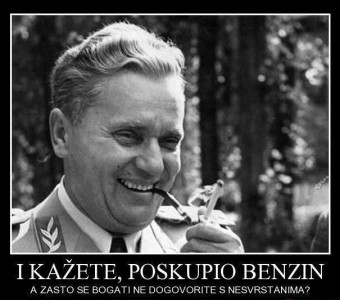Continuous increase of fuel prices is a cause of much concern for citizens of Macedonia, and some vent the tension through humor. The prices are set by a regulatory body, and more and more social media users object to the fact that the lion's share of the revenue in fact goes to the government, stymieing the growth of the business sector.
On his blog, Zoriv published comparisons of the prices of oil derivatives in Macedonia, the USA and the EU [mk], and also calculated how much fuel one can buy on an average salary in various countries [mk]. (Both posts are in Macedonian, but the tables with country comparisons are in English and easily comprehensible.)
So, according to Zoriv, Latvia has the lowest price of gasoline in Europe (EUR 1.20), while Norway has the highest (EUR 1.94). Consumers in Macedonia have to pay EUR 1.4. While the official explanation for rising fuel prices is always the change of price of crude oil, Zoriv points out that a major factor in forming the end price are the excise taxes that go directly to the state budgets in countries with the highest prices (Norway, Holland, Italy, the UK, and Greece). He adds:
In Macedonia, for instance, the total taxation together with the profit margin for the merchants form around 70% of the price (Official Gazette of Republic of Macedonia, no. 138/09 and 52/11). The difference between Macedonia and the EU countries, alongside the salary levels which are incomparable, is the tragic fact that even the slightest increase of oil derivative prices affects the personal material existence of every citizen of Macedonia. The latest data show that fuel consumption has decreased by 30% [mk]. The increase of fuel prices leads to a spiral of the increase of all other living expenses, while family budgets drastically decrease.
The Macedonian government temporarily abolished the excise before the June 2011 elections, but returned it later, raising the prices [mk] in August.
By calculating how much fuel a citizen can buy with an average salary, Zoriv tried to shed light on income disparities: in the United States, one can buy 4,296 liters of gasoline on an average monthly salary. In Europe, the top spots go to Switzerland (3,441 l), Luxemburg (3,439 l), and Germany (3.075 l). The lowest on the list are Macedonia (243 l) and Albania (194 l), with a “disastrous ratio of 1:14″ compared to the leading “rich” countries.
According to the 2010 edition of the annual publication 200 Largest Companies in Macedonia, prepared and published by the Euro Business Center – Skopje, the two largest companies in the country are: the sole oil refinery OKTA (owned by the Greek interests, privatized while the current PM Gruevski served as the Minister of Finance) and the biggest oil derivatives distributor Makpetrol, with the total revenues of EUR 512 million and EUR 350 million, respectively.
The prospects for the future seem bleak. According to the UNDP report “Assessing the Economic Impact of Climate Change,” Macedonia also faces numerous other challenges in the energy sector.
Social media users shared various kinds of data related to the fuel price increase, such as the table [mk] showing the elements that form the prices of fuel, originally from an Radio Free Europe article [mk] by Srgjan Stojanchov:

Elements of fuel prices in Macedonian Denars.
They also posted various reactions to ongoing developments with the fuel prices, and the most shared were the humorous responses, such as this joke: “Would you like to take your girlfriend someplace expensive? – Take her to a gas station!” The latest chuckle is a demotivation-style meme featuring the late Yugoslav leader Josip Broz Tito and a supposed laconic quote in Croatian:

Photo of Tito and a supposed quote: You say the gasoline got more expensive? Well, why don't you make a deal with the Non-Aligned countries?
During the Cold War, Tito was famous for striking a balance between Eastern and Western blocs, with Yugoslavia serving as a kind of a buffer, to the commercial benefit of its people. In 1961, he co-founded the Non-Aligned Movement, which included many oil-producing nations, resulting in favorable trade relations. A famous political-economic quote attributed to him (in the Lexicon of Yugoslav Mythology) is this: “The grain that we received from the Americans is much superior in quality to the grain the Soviets did not deliver.”







2 comments